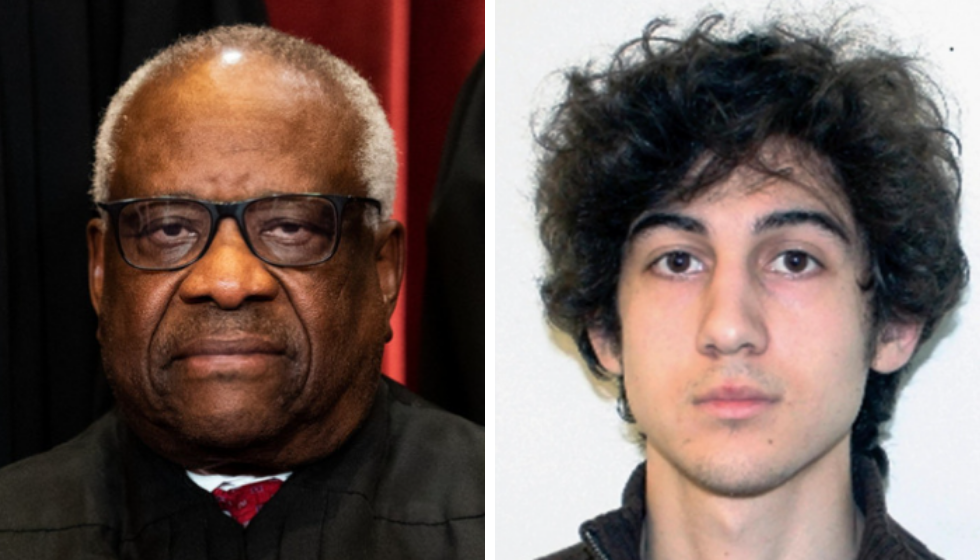OPINION: This article may contain commentary which reflects the author's opinion.
The U.S. Supreme Court voted 6-3 on Friday to reimpose the death sentence for Boston Marathon bomber Dzhokhar Tsarnaev.
The decision reversed a federal appeals court ruling that had voided it.
“By a vote of 6-3, the court rejected defense claims that the judge at Tsarnaev’s 2015 trial improperly restricted the questioning of prospective jurors and was wrong to exclude evidence of a separate crime two years before the bombing,” NBC News reported.
“Tsarnaev was convicted of joining his older brother, Tamerlan, in planting and detonating two pressure-cooker bombs at separate spots near the marathon finish line in 2013. The blasts killed three people and left hundreds of others with serious injuries,” the report added.
“In a second phase of the trial, the same jury recommended capital punishment for the deaths of the two people killed by the bomb the younger Tsarnaev placed. His older brother was killed in a shootout with police four days after the bombing. A three-judge panel of the U.S. Court of Appeals for the 1st Circuit ordered a new sentencing hearing, ruling unanimously that U.S. District Judge George O’Toole Jr. failed to allow enough questioning of potential jurors about how closely they followed extensive news coverage of the bombings,” the report stated.
“But the Supreme Court disagreed on that issue. Writing for the majority, Justice Clarence Thomas said trial judges have broad discretion in deciding what questions to ask prospective jurors,” the report said.
6-3: Supreme Court votes to reinstate the death penalty for Boston Marathon bomber Dzhokhar A. Tsarnaev.
Justice Clarence Thomas delivered the Court's opinion. pic.twitter.com/DsgzF1V8ry
— The Recount (@therecount) March 4, 2022
The Supreme Court reinstated the death penalty for Boston Marathon bomber Dzhokhar Tsarnaev, ruling that a lower court had provided him a fair trial despite the national media frenzy that surrounded the case.https://t.co/WAWYrrwpMV
— USA TODAY (@USATODAY) March 4, 2022
“Dzhokhar Tsarnaev committed heinous crimes,” Justice Clarence Thomas wrote in the opinion. “The Sixth Amendment nonetheless guaranteed him a fair trial before an impartial jury. He received one.”
“The Tsarnaev brothers immigrated to the United States in the early 2000s and lived in Massachusetts. Little more
than a decade later, they were actively contemplating how to wage radical jihad. They downloaded and read al Qaeda propaganda, and, by December of 2012, began studying an al Qaeda guide to bomb-making. On April 15, 2013, the brothers went to the Boston Marathon finish line on Boylston Street. They each brought a backpack containing a homemade pressure-cooker bomb packed with explosives inside a layer of nails, BBs, and other metal scraps. Tamerlan left his backpack in a crowd of spectators and walked away. Dzhokhar stood with his
backpack outside the Forum, a nearby restaurant where spectators watched the runners from the sidewalk and dining patio. For four minutes, Dzhokhar surveyed the crowd,” Thomas wrote.
“After speaking with Tamerlan by phone, Dzhokhar left his backpack among the spectators. Tamerlan then detonated his bomb. While the crowd at the Forum looked toward the explosion, Dzhokhar walked the other way. After a few seconds, he detonated his bomb,” he added.
“Three courts including this Court have now examined this record with care. Why? Why are appellate courts so
deeply involved in what is, after all, a trial-based evidentiary matter? The reason, in my view, lies in part in the
nature of the underlying proceeding. It is a death penalty proceeding. And where death is at stake, the courts (and Congress) believe that particular judicial care is required,” he continued.
“Special hearing to determine whether a sentence of death is justified” (boldface omitted)); Cf. Kyles v. Whitley, 514 U. S. 419, 422 (1995) (“[O]ur duty to search for constitutional error with painstaking care is never more exacting than it is in a capital case” (internal quotation marks omitted)); Zant, 462 U. S., at 885 (“[T]he severity of the [death] sentence mandates careful scrutiny in the review of any colorable claim of error”); Gregg, 428 U. S., at 187 (joint opinion) (“When a defendant’s life is at stake, the Court has been particularly sensitive to insure that every safeguard is observed”); Glossip v. Gross, 576 U. S. 863, 937 (2015) (BREYER, J., dissenting) (“[I]t is difficult for judges, as it would be difficult for anyone, not to apply legal requirements punctiliously when the consequences of failing to do so may well be death”). That same care applies on abuse-of-discretion review, just as it does for any other standard,” he added.
